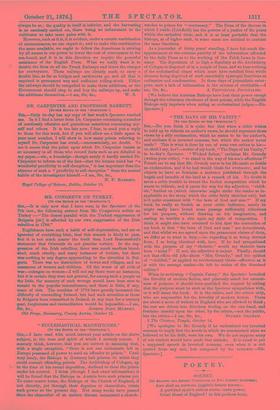"THE DAYS OF HIS VANITY."
[TO THE EDITOR OF THE "SPECTATOR.")
Sre,—Do you think it is quite fair that when a critic wishes to hold up to ridicule an author's views, he should represent those views by a silly exclamation, which he states to be the author's,
and encloses it in inverted commas, but which the author never made ? This is what is done by one of your own critics in his—
or, shall I say, her?—notice of my book, "The Days of his Vanity,"
in to-day's Spectator. "Wicked father," exclaims Mr. Grundy (writes your critic), "to stand in the way of his son's affections I"
Permit me to say that Mr. Grundy never in his life made so feeble an exclamation, and if he had would blush for evermore ; and he objects to have so feminine a sentence published through the length and breadth of the land as a remark of his. No doubt it saves a critic trouble to invent the foolish composition which he wants to ridicule, and it paves the way for the adjective, "child- ish," further on (which otherwise might strike the reader as in- applicable to the story, which the critic fairly sketches out), but is it quite consistent with "the laws of God and man ?" If my book be really so foolish as your critic indicates, surely he might easily have found some passage sufficiently ridiculous for his purpose, without drawing on his imagination, and
casting so terrible a slur upon my style of composition. I
think it might also have occurred to him that the contention of my book is that "the laws of God and man" are inconsistent, and that whilst we are agreed upon the paramount claims of duty,
we differ as to what is duty,—he regarding it as being distinct from, I as being identical with, love. If he had sympathised
with the purpose of my "rhetoric," would my rhetoric have been " noisy ?" If not, the adjective is unjust. Finally, should not that effete old joke about "Mrs. Grundy," and the epithet
of "childish," as applied to revolutionary views—effective as it is with the average reader—be left to critics of the Standard calibre ?
When in reviewing "Captain Fanny," the Spectator bewailed the frivolity of modern fiction, and piteously asked for earnest- ness of purpose, it should have qualified the request by adding that the purpose must be such as the Spectator sympathises with, or it will damn the book. It is the critics, and the critics only, who are responsible for the frivolity of modern fiction. There are about a score of writers in England who are allowed to think ; the rest are driven into frivolous fooling on the one hand, and feminine inanity upon the other, by the critics,—not the public, but the critics.—I am, Sir, &c., SYDNEY GRUNDY. 2 The Cloisters, Temple, October 14.
[We apologise to Mr. Grundy if he understood our inverted commas to imply that the words in which we summarised what we
believed to be his drift, were his own. We do not suppose many of our readers would have made that mistake. It is usual to put a supposed speech in inverted commas, even when it is not quoted from any one, but composed by the reviewer.—En. Spectator.]


































 Previous page
Previous page